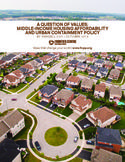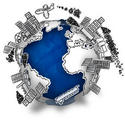This is the Executive Summary from a new report “A Question of Values: Middle-Income Housing Affordability and Urban Containment Policy" authored by Wendell Cox and published by the Frontier Centre for Public Policy. Ailin He, a PhD doctoral candidate in economics at McGill University served as research assistant. read more »
Policy
A Question of Values: Middle-Income Housing Affordability
- Login to post comments
Are We Heading for An Economic Civil War?
When we speak about the ever-expanding chasm that defines modern American politics, we usually focus on cultural issues such as gay marriage, race, or religion. But as often has been the case throughout our history, the biggest source of division may be largely economic.
Today we see a growing conflict between the economy that produces consumable, tangible goods and another economy, now ascendant, that deals largely in the intangible world of media, software, and entertainment. Like the old divide between the agrarian South and the industrial North before the Civil War, this threatens to become what President Lincoln’s Secretary of State, William Seward, defined as an “irrepressible conflict.” read more »
So Much For The Death Of Sprawl: America's Exurbs Are Booming
It’s time to put an end to the urban legend of the impending death of America’s suburbs. With the aging of the millennial generation, and growing interest from minorities and immigrants, these communities are getting a fresh infusion of residents looking for child-friendly, affordable, lower-density living. read more »
Auckland Tackles Housing Affordability Crisis
City of Auckland Chief Economist Chris Parker has called for establishment of a house price to income ratio objective of 5.0, to be achieved by 2030. The recommendation was included in a report commissioned by Auckland Mayor Len Brown and Deputy Mayor Penny Hulse.
Housing Affordability and Urban Containment Policy
The recommendation has been brought about in response to Auckland's severely unaffordable housing. Recent reports indicate a price to income ratio over 9.0, at least triple that of New Zealand to the early 1990s. read more »
- Login to post comments
How Big Government and Big Business Stick It to Small U.S. Businesses
From the inception of the Soviet Union, transformation was built, quite consciously, on eliminating those forces that could impede radical change. In many ways, the true enemy was not the large foreign capitalists (some of whom were welcomed from abroad to aid modernization) but the small firm, the independent property owner. read more »
- Login to post comments
Conferences and Progress
Californians attend innumerable conferences on housing and economic growth. Year after year, in counties across California, the same people show up to say and hear the same things. Mostly what they say and hear is naive, and nothing ever changes.
I was reminded of this when I saw a report on what appears to have been a typical conference at the Harris Ranch on Growing the Central Valley Economy. read more »
- Login to post comments
Environmental Activists Turn up the Rhetorical Heat
What is the endgame of the contemporary green movement? It’s a critical question since environmentalism arguably has become the leading ideological influence in both California government and within the Obama administration. In their public pronouncements, environmental activists have been adept at portraying the green movement as reasonable, science-based and even welcoming of economic growth, often citing the much-exaggerated promise of green jobs. read more »
Oil Bust? Bah -- North Dakota Is Still Poised To Thrive
Oil and gas companies have the worst public image of any industry in the United States, according to Gallup. But it’s well-loved in a swathe of the U.S. from the northern Plains to the Gulf Coast, where the boom in unconventional energy production has transformed economies, enlivened cities and reversed negative demographic trends. read more »
Who Should Pay for the Transportation Infrastructure?
Urban regions are significantly more important than any one city located within them. Housing, transportation, economy, and politics help produce uneven local geographies that shape the individual identities of places and create the social landscapes we inherit and experience. As such, decisions made within one city can ripple through the entire urban region. When affordable housing is systematically ignored by one city, neighboring cities become destinations for those who cannot afford higher housing costs. read more »
- Login to post comments
Is This Hell or Indianapolis?
I’ve observed many times that cities outside of the very top tier almost always come across as generic, cheesy, and trying too hard in their marketing efforts. They highlight everything about their city that is pretty much a variant on things everybody else already has (beer, beards, bicycles, etc) while downplaying the things that truly reflect their community. Call it “aspirational genericism.” read more »
- Login to post comments






















